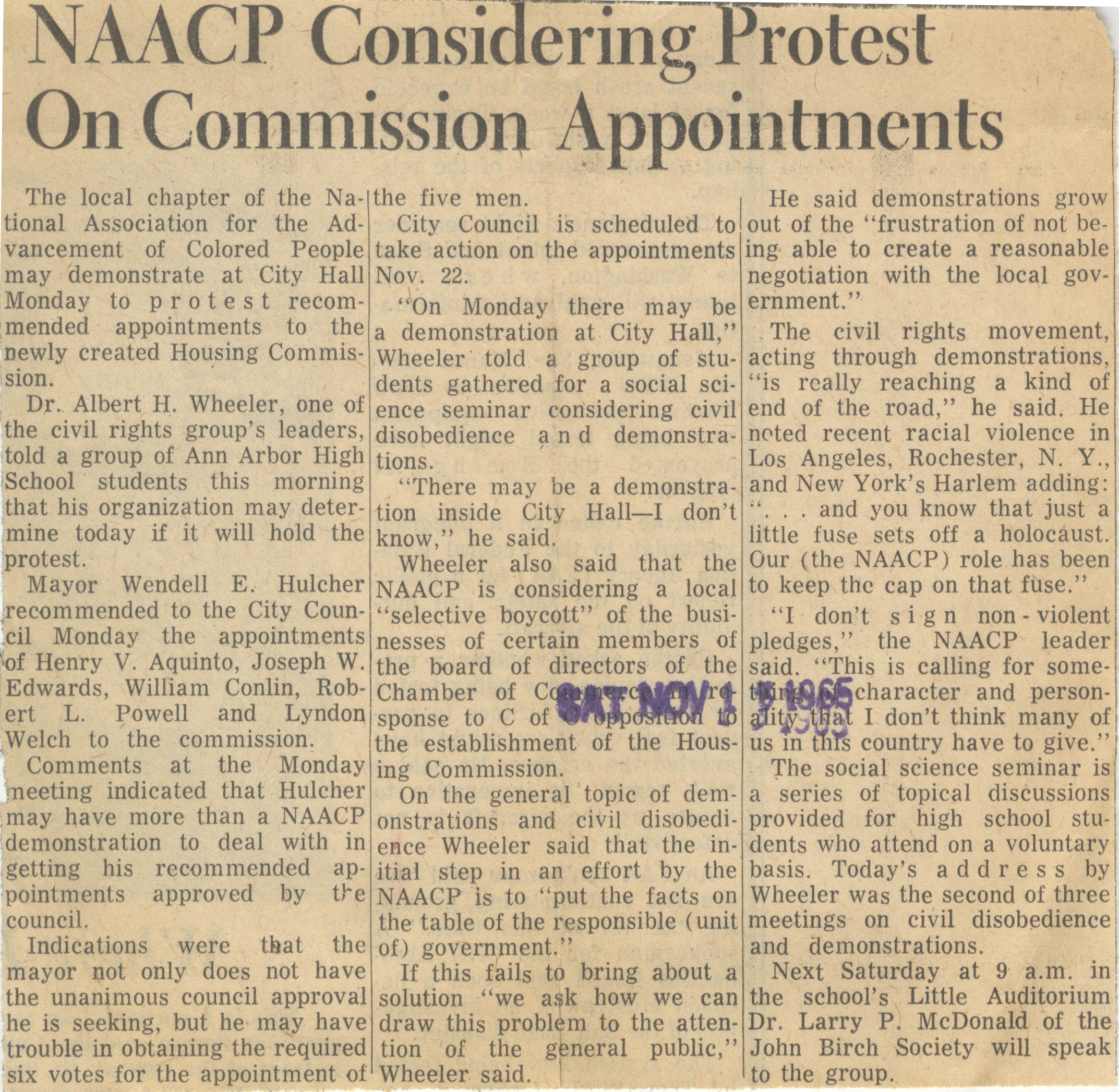NAACP Considering Protest On Commission Appointments

NAACP Considering Protest On Commission Appointments
The local chapter of the National Association for the Advancement of Colored People may demonstrate at City Hall Monday to protest recommended appointments to the Dewly created Housing Commission.
Dr. Albert H. Wheeler, one of the civil rights group’s leaders, told a group of Ann Arbor High School students this morning that his organization may determine today if it will hold the protest.
Mayor Wendell E. Hulcher recommended to the City Council Monday the appointments 'of Henry V. Aquinto, Joseph W. Edwards, William Conlin, Robert L. Powell and Lyndon Welch to the commission.
Comments at the Monday meeting indicated that Hulcher may have more than a NAACP demonstration to deal with in getting his recommended appointments approved by the council.
Indications were that the mayor not only does not have the unanimous council approval he is seeking, but he may have trouble in obtaining the required six votes for the appointment of the five men.
City Council is scheduled to take action on the appointments Nov. 22.
“On Monday there may be a demonstration at City Hall,” Wheeler told a group of students gathered for a social sci-lence seminar considering civil disobedience and demonstrations.
“There may be a demonstration inside City Hall—I don’t know,” he said.
Wheeler also said that the NAACP is considering a local “selective boycott” of the businesses of certain members of the board of directors of the Chamber of Commerce response to C of C opposition to the establishment of the Housing Commission.
On the general topic of demonstrations and civil disobedience Wheeler said that the initial step in an effort by the NAACP is to "put the facts on the table of the responsible (unit of) government.”
If this fails to bring about a solution “we ask how we can draw this problem to the attention of the general public,” Wheeler said.
He said demonstrations grow out of the “frustration of not being able to create a reasonable negotiation with the local government.”
The civil rights movement, acting through demonstrations, “is really reaching a kind of end of the road,” he said. He noted recent racial violence in Los Angeles, Rochester, N. Y., and New York’s Harlem adding: "... and you know that just a little fuse sets off a holocaust. Our (the NAACP) role has been to keep the cap on that fuse.”
“I don't sign non-violent pledges,” the NAACP leader said. "This is calling for something of character and personality that I don't think many of us in this country have to give."
The social science seminar is a series of topical discussions provided for high school students who attend on a voluntary basis. Today’s address by Wheeler was the second of three meetings on civil disobedience and demonstrations.
Next Saturday at 9 a.m. in the school’s Little Auditorium Dr. Larry P. McDonald of the John Birch Society will speak to the group.
Article
Subjects
Black Americans
Black History
National Association for the Advancement of Colored People (NAACP)
Civil Rights
Ann Arbor - City Hall
Ann Arbor Housing Commission
Ann Arbor City Council
Ann Arbor Area Chamber Of Commerce
Old News
Ann Arbor News
Albert H. Wheeler
Wendell E. Hulcher
Henry V. Aquinto
Joseph W. Edwards
William Conlin
Robert L. Powell
Lyndon Welch
Larry P. McDonald